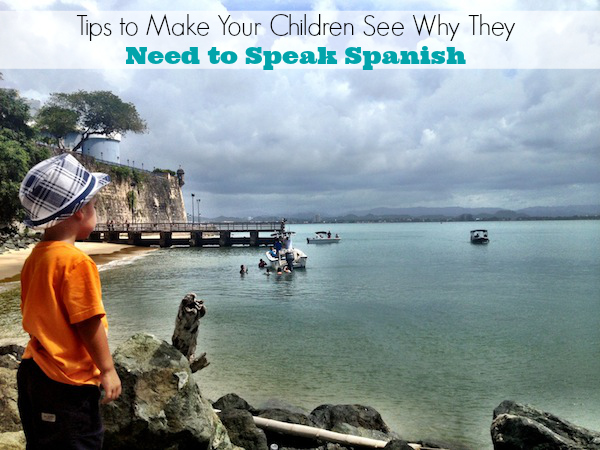
One of the most common struggles for parents raising bilingual kids is getting their children to speak Spanish. This is especially true once the rebellion stage hits and children refuse to use their minority language making their parents extremely frustrated.
Bilingualism experts agree that one of the most important tasks for parents raising a child with two languages is to create a perceived need for the minority language. In other words, your kid HAS to feel there are some circumstances in which she NEEDS her minority language to communicate.
How do you do this? Check out some tips:
1) Invite your Spanish-speaking family/friends to stay with you: As many of you know, we had some of my family visiting us last month from Peru and Mexico. This gave my children the opportunity to experience first-hand how important it is for them to speak Spanish to communicate with their aunts, uncles and cousins.
2) Show them you’re proud of speaking Spanish and of your Latino culture: If your children see you take pride in your language and your culture, they will follow suit. I saw this happen before my very own eyes with my stepson. His father, my husband, is extremely proud to be Puerto Rican. He has always spoken highly of his beloved Island, its music, its food, its folklore. He owns a vast collection of Puerto Rican music which he plays on a regular basis. My stepson, although born and raised in Miami, has always identified himself with his father’s home country. I hope my kids have a similar connection not only to Puerto Rico, but to Peru, my homeland.
3) Give your friends & your kids’ friends a taste of your heritage: Not only will you show your kids how proud you are of your culture (tip #2), but it could also be a lot of fun. Hispanic Heritage Month, which is almost upon us, is a great time to do this. If you happen to be from one of the countries celebrating their Independence Day during this time, you can throw a party. Serve traditional food from your country of origin and teach the children a few words in Spanish. Again, if your children see that you’re proud of your heritage, they will be too!
4) Expose your children to Spanish and their Latino culture first-hand: Traveling to a country where the Spanish is spoken is probably one of the best ways to create a perceived need. Although it’s sad that both my husband’s and my family is dispersed in different Latin American countries, it does gives us the opportunity to go visit them, allowing our children to be immersed in the language while spending time with their family, as we did this summer. Our plan is that as soon as Vanessa and Santiago are old enough, they will spend their summers with their cousins in Puerto Rico. We did this with my now 22-year-old stepson as he was growing up, and I’m convinced this is one of the major reasons he is bilingual today.
{photo by kate.gardiner}


Great points. I’m big on the perceived need (I learned the concept from you, Roxana). But the more experienced I become as a parent (my boys are 4 and 6), the more it becomes apparent that what you do (and what your kids see you do) is more important than what you say. So if you commit to speaking the language you’re trying to teach them (which, even for a native Spanish speaker like me can be hard), then you are showing them that it is meaningful and important. And much to my delight, even if their brain slips into English for a word here and there, I see them trying to honor that code that they and I speak. Eventually, I’m ready to resort to cash incentives, but not yet.
I learned to speak Spanish as an adult; I went to live in Spain and Latin America for a couple of years of private schools and total immersion. I’m married to a native speaker and my mother in law is monolingual, we go visit the family in Central America every year, even so I can’t get the girls to speak the language, they understand but won’t speak it.
What if you’re an English speaker and your children are in Spanish Immersion. How can translate the need if no one in your family speaks the minority language. We plan to travel abroad soon, but are their other ways to convey need? I only speak a little Spanish and my 6.5 year old now knows more than me. But I see the rebellious stage from her and my younger son on Speaking it.